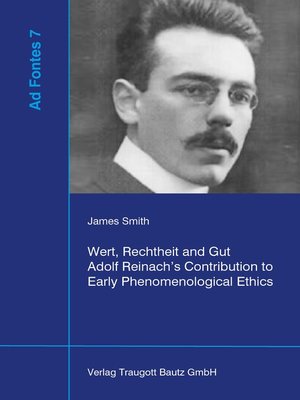Wert, Rechtheit und Gut Adolf Reinach's Contribution to Early Phenomenological Ethics
ebook ∣ Ad Fontes
By James Smith

Sign up to save your library
With an OverDrive account, you can save your favorite libraries for at-a-glance information about availability. Find out more about OverDrive accounts.
Find this title in Libby, the library reading app by OverDrive.



Search for a digital library with this title
Title found at these libraries:
| Library Name | Distance |
|---|---|
| Loading... |
Adolf Reinach (1883-1917) is one of the most important figures in the history of phenomenological philosophy. As a teacher at the University of Göttingen, his form of phenomenology was influential for many early phenomenologists, including Edith Stein and Dietrich von Hildebrand, shaping to a greater or lesser extent the development of an entire philosophical school of thought. As a philosopher in his own right, he wrote on a number of topics from phenomenological theory to the philosophy of law. Today Reinach is best known for his work on the phenomenology of judgements, states of affairs and social acts. Yet in both his published and unpublished works, ethics are also a significant theme. In a 1913 lecture, Reinach declared the question of whether we have objective knowledge of values – knowledge of what is good, what is moral – to be perhaps the most important in the world. In this book, Adolf Reinach's work on ethics is explored alongside that of his colleagues and contemporaries. Building from Reinach's publications and transcripts of his lectures, we examine Reinach's writings on topics including values, obligations, motivation and freedom, and consider how this work stands up as a contribution to the field of early phenomenological ethics.







